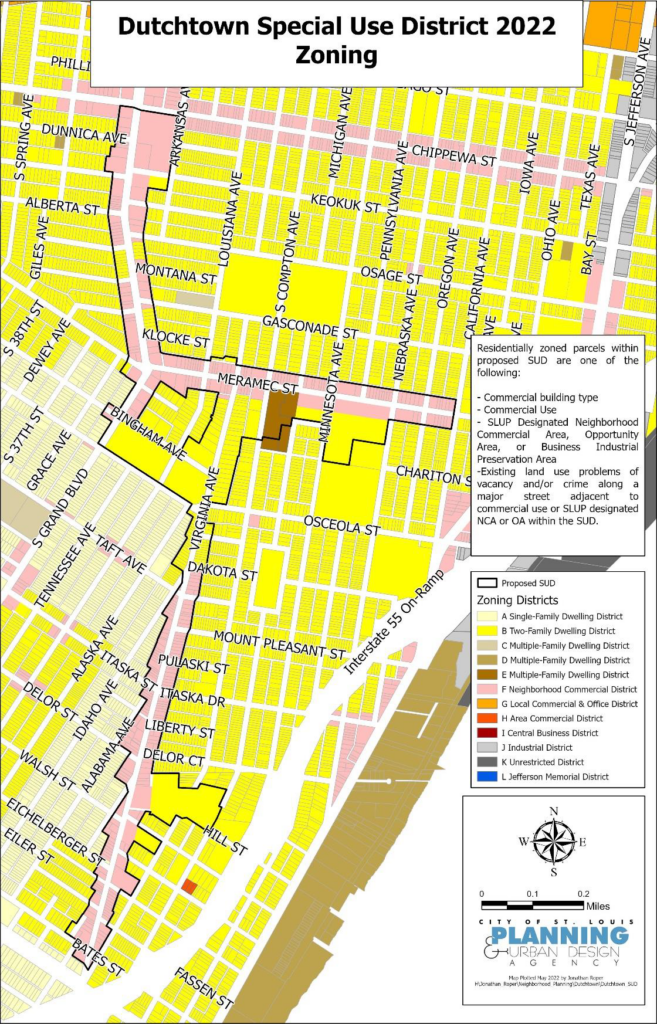Ald. Shane Cohn introduced Board Bill 52 to create a Special Use District (SUD) for parts of the Dutchtown, Mount Pleasant, and Carondelet neighborhoods in parts of the 9th, 11th, 20th, and 25th wards (mostly the new 3rd ward), covering 91.75 acres, mainly along Grand, Meramec, and Virginia. It would:
permit select uses, prohibit certain uses, and make others conditional uses that would otherwise be allowed in the “B” Two-Family Dwelling, “E” Multi-Family Dwelling, and “F” Neighborhood Commercial Zoning Districts. The Board Bill also provides additional regulations around height, signage, fences, landscape buffers, parking, hours of operation, lighting, and refuse enclosures and dumpsters.
NextSTL – The South Grand Community Creates a Special Use District
From the Planning Commission Summary-
The proposed SUD prohibits 6 different uses that either have documented criminal activity or have the potential to attract criminal activity, and/or uses that detract from the walkable and family commercial storefront environment such as motor fuel pumping stations, convenience stores that sell tobacco products, or warehousing. Uses that currently exist in the Area, but would become nonconforming, would be grandfathered-in. The SUD reduces the nonconforming period from 1 year to 30 days (meaning that if a business of a non-conforming nature closed another would have to open within 30 days in order to maintain the grandfathering).
The proposed SUD permits 8 uses, deemed potentially desirable under certain conditions, subject to the conditional use provisions in order to allow the neighborhoods the opportunity to participate in a public hearing to review the desirability of a business based on its individual circumstances on a case-by-case basis.
Additionally, the proposed SUD:
• Modifies the home occupation uses to better respond to the intertwined commercial/residential areas, to conform to the Gravois Jefferson Historic Neighborhoods Plan for live/work spaces, and to provide additional services greatly lacking in the area.
• Increases the height for buildings to six stories to respond to large opportunity sites such as the former Cleveland High School.
• Limits signage to 30% of the area of all windows of a store frontage, and 40% of each window, to allow for more security and responds to the pedestrian comfortability along the corridor.
• Requires fences within front yards to be no more than 4 feet in height, and prohibits barbed wire to improve the pedestrian experience along the commercial corridors.
• Requires new parking lots to install landscape buffers with trees and bushes along the street, and wheel stops at the end of parking spaces, to protect people and property from vehicle overhangs, and enhance the pedestrian experience along the commercial corridors.
• Sets full cutoff lighting requirements for parking lots to reduce the light intrusion on adjacent properties, specifically residential.
• Lowers the parking requirements for all uses to conform to the Gravois Jefferson Historic Neighborhoods Plan, which helps protect the existing parcel fabric by reducing incentives to demolish buildings to create parking.
• Sets standards for refuse enclosures and dumpsters to be maintained in a clean and orderly appearance to address the dumping and rubbish in order to create a clean, safe environment for people.
• Sets hours of operation for permitted businesses.
Formulation of the plan for the SUD included public engagement via an online survey and-
Public Meetings
• Dutchtown Main Streets – Economic Vitality Meeting March 8, 2022
• Gravois-Jefferson Development Review Committee Meeting March 16, 2022
• Dutchtown Community Improvement District Board Meeting March 22, 2022
• Dutchtown Main Streets Meeting May 3, 2022
Pop-ups
• Pop-up at Meramec Magic March 19, 2022
Local Institutions Meetings
• Meramec Elementary
• St. Anthony of Padua
• St. Lukes Lutheran Church
• St. Mary’s High School
Community Organizations
• DeSales Community Development Corporation
• St. Joseph’s Housing Initiative,
• Lutheran Development Group
• Tower Grove Neighborhoods Community Development Corporation
Prohibited uses include cell towers, gas stations, outdoor pay telephones, public storage facilities, and warehouses. Conditional uses include auto part and truck part sales, blood or plasma donor facilities, candle manufacturers (forbidden by current zoning), cell phone, beeper, and pager shops, food manufacturers, and glass blowing shops (forbidden by current zoning). Convenience stores are a conditional use if they offer fresh fruits and vegetables, do not offer tobacco products, offer hot and cold prepared food, and offer baked items.
Permitted uses include-
A) Arcades
B) Art studios
C) Art galleries
D) Artisan manufacturers not exceeding three thousand five hundred (3,500) square feet;
E) Coffee or tea shops
F) Delis and cafes
G) Dry goods shops
H) Fitness center and gyms
I) Gift shops
J) Grocery stores that comply with the following requirements
i. Offers fresh fruits and vegetables intended for home preparation and consumption
ii. Does not offer tobacco products
K) Hobby and toy shops
L) Professional or general offices
M) Restaurants or carryout restaurants with or without walk-up windows that
i. Do not have a drive thru
N) Yoga therapy or yoga studios
O) Multi-family that follows the population density of the “E” Multiple-Family Dwelling District
P) A mix of uses as permitted under Section Six or Section Seven of this Ordinance.
The SUD would eliminate parking minimums for commercials uses and for residential dwellings with eight or fewer units. For residential dwellings with greater than eight units, the minimum is 0.6 spaces per unit. #parkingsmartstl
There will be opportunities for people to comment during hearings for the bill.
It’s great to see the recognition of the negative impact that low-productivity auto-oriented land uses and the regulations that encourage and mandate them have on a community. Banning dangerous, wealth destroying, land wasting uses like gas stations and drive thrus should be applied to more of the city, as well as reducing and eliminating parking mandates. We’d be wealthier, healthier, and happier for it.


